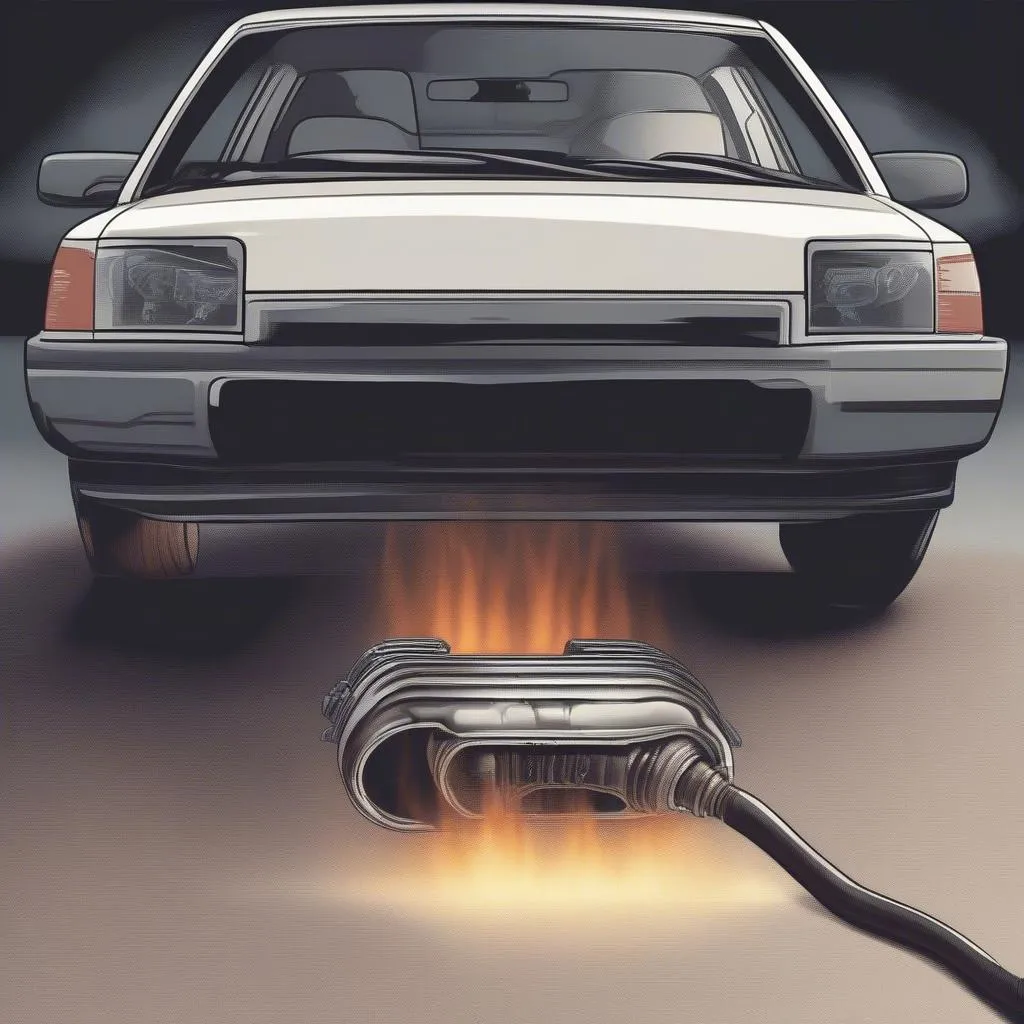Have you ever been driving down the road, enjoying your favorite tunes, when your car’s check engine light suddenly pops on? You pull over, check under the hood, and everything seems fine. But the light stays on, and you start to worry. What could be wrong?
One of the most common reasons for a check engine light is a problem with the catalytic converter. This important part of your car’s exhaust system helps to reduce harmful emissions, and a faulty catalytic converter can lead to a whole host of problems, including poor fuel economy and a decrease in power.
Understanding the Significance of a Catalytic Converter Obd Code
From the perspective of an automotive repair professional, a Catalytic Converter Obd Code indicates a malfunction in the emissions control system, specifically within the catalytic converter itself. This can range from a simple sensor failure to a more serious issue like a clogged or damaged converter.
Deciphering the Code: A Step-by-Step Guide
A catalytic converter OBD code, also known as a Diagnostic Trouble Code (DTC), will provide valuable information about the specific problem. Here’s what you need to know:
1. Understanding the OBD Code:
OBD codes are a standardized system for communicating issues with a car’s electronic systems. They usually consist of a series of letters and numbers. For example, a code like “P0420” would indicate a problem with the catalytic converter.
2. Diagnosing the Problem:
Once you know the OBD code, you can use a diagnostic tool like a dealer scanner to determine the exact cause of the issue. Dealer scanners are designed specifically for European cars, and they can provide more detailed information about the problem than a generic OBDII scanner.
3. Troubleshooting a Catalytic Converter Issue:
If you’re confident in your mechanical skills, you can try to troubleshoot the problem yourself.
Common Causes of a Catalytic Converter OBD Code:
- Clogged Catalytic Converter: This can occur due to a variety of factors, such as a buildup of carbon deposits from poor fuel or a misfire in the engine.
- Damaged Catalytic Converter: A physical impact, like a pothole, can damage the converter, causing it to malfunction.
- Oxygen Sensor Failure: Oxygen sensors monitor the exhaust gases and can trigger a catalytic converter code if they fail.
- Exhaust Leak: A leak in the exhaust system can disrupt the proper flow of gases through the catalytic converter.
4. Determining the Best Solution:
Once you have diagnosed the problem, you can decide on the best course of action. For example, if the problem is a simple sensor failure, you can replace the sensor. However, if the converter itself is damaged, you may need to replace it entirely.
5. Importance of a Mechanic’s Expertise:
Although you can try to troubleshoot a catalytic converter issue yourself, it’s always best to consult a qualified mechanic, especially if you’re unsure about the problem. A professional mechanic can diagnose the issue accurately and provide you with the best possible solution.
What Other Questions do People Usually Ask?
Here are a few common questions related to catalytic converter OBD codes:
- What are the symptoms of a bad catalytic converter?
- How much does it cost to replace a catalytic converter?
- Can I drive my car with a bad catalytic converter?
- What are the legal consequences of driving with a bad catalytic converter?
- Are there any ways to prevent a catalytic converter from failing?
These are just a few of the many questions that people have about catalytic converter OBD codes.
Let’s dive deeper into some of these questions, and find solutions that work for you!
 catalytic-converter-obd-code
catalytic-converter-obd-code
Common Catalytic Converter Obd Codes and Their Meaning:
Here’s a list of some common catalytic converter OBD codes and what they typically indicate:
- P0420 – Catalytic Converter System Efficiency Below Threshold (Bank 1)
- P0430 – Catalytic Converter System Efficiency Below Threshold (Bank 2)
- P0421 – Heated Catalyst Efficiency Below Threshold (Bank 1)
- P0431 – Heated Catalyst Efficiency Below Threshold (Bank 2)
- P0422 – Catalyst System Efficiency Below Threshold (Bank 1)
- P0432 – Catalyst System Efficiency Below Threshold (Bank 2)
Remember, these are just general guidelines. Always consult your car’s owner’s manual or a qualified mechanic for the most accurate diagnosis.
What Are the Symptoms of a Bad Catalytic Converter?
In addition to a check engine light, other symptoms of a faulty catalytic converter can include:
- Reduced Engine Power: You may notice that your car has less power than usual, especially when accelerating.
- Poor Fuel Economy: A bad catalytic converter can cause your car to use more fuel than it should.
- Exhaust Smoke: You might see exhaust smoke coming from the tailpipe, even if the engine is running smoothly.
- Loud Exhaust Noise: A damaged catalytic converter can create a loud, rattling noise in the exhaust system.
What Should I Do if My Car Has a Catalytic Converter Issue?
If you suspect your car has a catalytic converter issue, you should take it to a qualified mechanic as soon as possible. A mechanic can diagnose the problem accurately and provide you with the best possible solution. If you’re unsure, you can also consult your car’s owner’s manual for specific instructions.
Need Assistance with Your Car’s Diagnostics?
Reach out to us at Tech Car USA! We have a team of skilled mechanics who are experts in diagnosing and repairing catalytic converter issues. We offer comprehensive diagnostic services, including the use of dealer scanners for European vehicles. Don’t let a check engine light ruin your day!
Contact us today via WhatsApp at +84767531508 for a free consultation!
Conclusion:
Understanding the meaning of catalytic converter OBD codes is crucial for maintaining your car’s performance and ensuring its safety. A faulty catalytic converter can lead to serious problems, so it’s important to address any issues promptly. If you’re experiencing any of the symptoms mentioned above, don’t hesitate to contact a qualified mechanic for assistance. Remember, a little preventive maintenance can go a long way in keeping your car running smoothly!
We encourage you to leave a comment below with any questions you may have or share your experience with catalytic converter issues.
Keep exploring our website for more helpful articles on car maintenance and repair!
 catalytic-converter-obd-code
catalytic-converter-obd-code